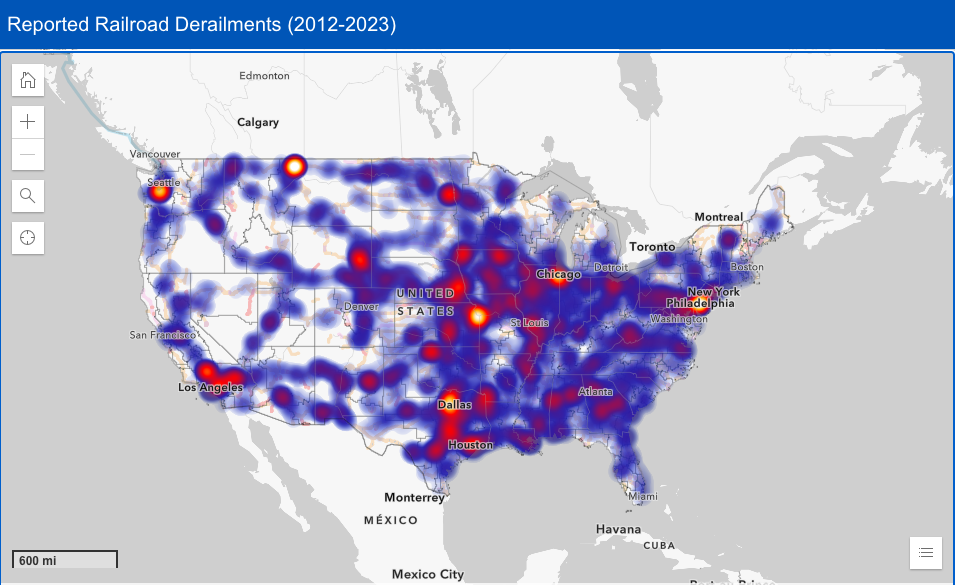Connecting state and local government leaders
Few are as dangerous as the one in East Palestine, but city advocates hope the online tool showing the location of thousands of derailments will underscore the need for a federal safety law.
Updated at 10 a.m. June 15, 2023
With Congress considering legislation to improve rail safety, the National League of Cities published a map showing how common derailments are in communities across the country.
The map gives the location and other information about more than 12,000 incidents between 2013 and 2022. The illustration shows that there are few stretches along the 140,000 miles of track in the country that are free of or far from derailments.
“Our view is, you can’t look at this map and look away. You can’t look at this and say that it’s not a national issue that deserves people’s attention,” said Brittney Kohler, NLC’s legislative director of transportation and infrastructure.

Congress stepped up its scrutiny of rail safety following the February derailment of a Norfolk Southern train carrying toxic chemicals in East Palestine, Ohio. Several cars that came off the tracks there began leaking vinyl chloride, which ignited and forced thousands of local residents to evacuate the area.
Most derailments are not nearly as dangerous or dramatic. In fact, an average of three trains a day leave their tracks, often in railyards. What’s more, the number of accidents has fallen by nearly a half since 2000, and railroad industry advocates maintain that trains are one of the safest ways to move freight over long distances.
Ted Greener, a spokesperson for the Association of American Railroads, which represents both freight and passenger carriers, said the industry has made many improvements over the last decade to help reduce derailments. But the NLC map includes derailments that happened before those changes were put into place.
“Conditions today on the rail network are not what they were 10 years ago," he said. "In fact, the mainline accident rate is down 8% since 2013. We have positive train control, risk reduction programs and greater use of automated track inspection. For response and mitigation, there is improved AskRail access for first responders. Aggregating the accidents in one place, versus showing the trendline over the years, makes something from 10 years ago seem just as likely to happen today as it would have been in 2012. That’s simply not the case."
City officials, though, have complained that derailed trains block crossings, cause property damage and require responses from emergency responders.
“It’s really important to tell communities that what they’ve seen in their community is not an isolated incident, that it is a phenomenon that has consequences across the country,” Kohler said. “The scope of the problem was sort of hidden before, and this unveils how quickly these [derailments] start to stack up and are reaching a boiling point.”
The group is supporting bipartisan legislation moving through the U.S. Senate that would beef up inspection requirements that could prevent derailments like the one in East Palestine. But the proposal goes beyond the causes of the Norfolk Southern accident—and beyond derailments—with provisions that, for example, require two-person crews and require a study of blocked crossings.
“This is not the East Palestine bill. It’s the railway safety bill. That’s intentional, because we have a bigger challenge here,” Kohler said. “It’s good business to keep trains moving, and to keep them on their track. In our view, this is an opportunity for us to look at how we can keep our transportation system moving forward efficiently and effectively.”
The map is intended to give city officials a “longitudinal view” of derailments, Kohler said, in a way that is easy to access. Federal data on derailments and many other topics takes months and sometimes years to share, she noted, saying real-time information would be preferable and more helpful to city officials.
In the meantime, though, NLC’s map will make it easier for local leaders to explore and understand the existing federal data. “Because you can really zoom in and get to a granular level,” Kohler said, “this makes doing your homework as a city official so much easier.”
Local leaders will not only be able to get a sense of how frequent the problems in their own jurisdictions, but also nearby. That can be helpful context, as the derailment in East Palestine showed. Communities in Pennsylvania also felt the fallout from the toxic spill in Ohio, she noted.
While the Federal Railroad Administration collects the derailment information, it isn’t able to do much more about it, Kohler said. She hopes that will change with the passage of the federal rail bill. “The purpose of the rail safety bill is to allow better connections between these incidents and action,” she said. “We don’t just let accidents and crashes and fatalities happen without going and understanding why.”
This story has been updated with a comment from the Association of American Railroads.
Daniel C. Vock is a senior reporter for Route Fifty based in Washington, D.C.

NEXT STORY: Feds Give States More Flexibility in Medicaid Redeterminations




